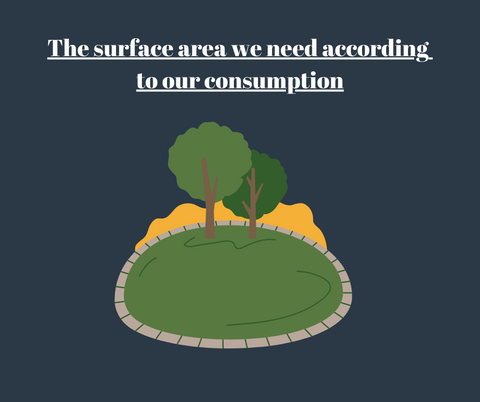
This is a concept which is at the heart of Eco Loco's concerns and which must be understood by everyone: the ecological footprint. Whether we talk about a zero waste lifestyle , responsible consumption, sustainable development or eco-responsibility , this amounts to referring to the ecological footprint.
What is the ecological footprint?
Developed in the early 2000s, the ecological footprint is a tool set up by the Global Footprint Network and it makes it possible to measure the pressure that humans exert on the environment. In other words, the ecological footprint is a way of quantifying the bioproductive land area necessary to produce what we consume (goods and services) and absorb the waste we produce.
.

From an individual point of view, this amounts to saying: what is the bioproductive surface area (land, air and sea) that I need to meet my consumption? This area represents the individual ecological footprint for a given period.
From a collective point of view, like the world population, it is the sum of all individual ecological footprints which represents the total human ecological footprint for a given time. This can also apply to a company, a region, a country, a continent...
We understand intuitively that if the collective way of life exerts too much pressure on the Earth, if the collective ecological footprint is greater than what the Earth has to offer, that our survival could be compromised in the more or less long term.
Calculate your ecological footprint
The calculation of the ecological footprint is based on your lifestyle and consumption habits. The diversity of the actions we take is taken into consideration. It is very surprising to see everything that is part of the calculation. Many daily actions are part of this, which reinforces the fact that every management counts .
.

For example, the following elements enter into the calculation:
- Transport: type of means of transport, distance traveled, frequency of travel, etc.
- Energy consumption: quantity consumed and type of energy (hydroelectricity, natural gas, propane, gasoline, etc.)
- Technological use: cell phone, computer, tablet, etc.).
- Food: meat, eggs and dairy products, frozen meals and cereals.
The Global Footprint Network provides us with a great tool to calculate this. This tool is very interesting because it allows us to know in which areas of your life our footprint is high and thus helps us target our actions.

Obviously, we will come back with another article on reducing your ecological footprint. We already have many articles that touch on different topics related to the ecological footprint. We invite you to browse our blog . But you guessed it, it goes from transport, to food, to energy as well as the waste that you generate. For the latter, we also offer you a range of items to facilitate your ecological transition.
Ecologically yours,














0 comments